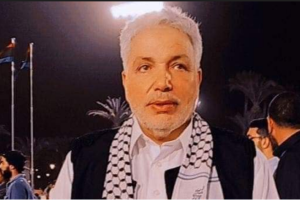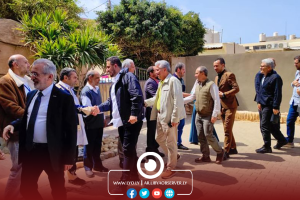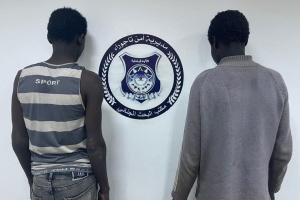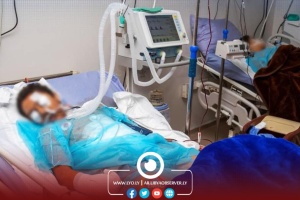What are the plans of the Municipality of Tajoura to take advantage of the huge potential of its resources? What are the problems and difficulties facing such plans?
What are the implications of the business people forum that was held recently in Tajoura in the municipality? Is there any cooperation with the Turkish business people?
What is Tajoura's share of Life's Restoration Projects? What does it lack to be a pioneering municipality?
All these questions and others are directed in this interview to Tajoura Municipal Secretary, Ayman al-Kateb.
The city of Tajoura has great economic, agricultural, tourism and geographical potentials that could enable it to establish successful investment projects in various fields. What are the municipality’s plans to take advantage of such potentials in a way that contributes to the development of the region?
Tajoura is the largest municipality in Greater Tripoli with great resources. The big problem in the municipality of Tajoura is, of course, the non-existence of planning in the past decades, and the municipality’s plan is supposed to be included in 2022, 2023 and 2024 targets, God willing, in terms of infrastructure, roads or housing, but the problems are of course enormous.
What are the problems and difficulties encountered by the municipality of Tajoura in implementing its development plan?
The main problems for the municipality of Tajoura and indeed for other municipalities in Libya, lie in the political and security issues, which led to instability of ministries and their institutions and agencies hampering their work, as well as in unsmooth succession at ministries. Consequently, this affected foreign and Libyan investors from investing in the municipalities.
We, for example, had the Swiss scheme in the early 1970s in Tajoura, and then they produced the second scheme, the German and Malaysian schemes for Tajoura. Unfortunately, this decade and indeed the decades before, they neither had implemented the Swiss scheme, nor the German scheme, and the rule of slums exists. Therefore, the biggest problem in Tajoura is planning, as approximately only 8% of the municipality area is planned. Within the general scheme, the state is always reluctant to take care of issues and address problems, escalating the issue of random construction and investment.
What are the halted projects in the municipality, and what is their percentage of execution? Why work in such projects has not yet been resumed?
There are several projects, of course, there are strategic projects related to Tajoura and others, for example, if the desalination plant is operational, it will supply a large part of Greater Tripoli, and we have East Tripoli Power Plant, which will serve Tajoura and Tripoli with electricity and water, these still have problems that needed to be addressed.
We have 10,000 housing-unit project that was halted at the beginning of the Revolution and construction has not yet been resumed. We also have the Marina Port Project, which is the Hamidiya Port. The port has about 30%, execution rate. Unfortunately, the project is halted. There are also other projects such as Fish Market, where construction is also suspended. These projects should be completed.
We have a project to connect the Man-Made River water, even though we have the reservoir since early 2000s, but until this moment, the connection has not been completed. We have other projects; several administrative centers in Tajoura, but they remain uncompleted buildings.
We have the pumping stations, we say that it is the problem of Al-Bifi and the problem of Arada, and it is also the problem of Tajoura itself which is the problems of rainwater drainage, it is an area that has no water drainage facilities, to dispose of so-called black wells. Now, there is no purification stations or pumping stations, so all drainage pours into the sea causing pollution, and most of the waters of Tripoli are in the sea, so all sea water of Tripoli is contaminated.
Tajoura abounds with tourism resources, the most renowned of which is the seashore and the forests which are good places to spend vacations and picnics.
Does the municipality of Tajoura have any plans to exploit these resources and set up investment projects such as resorts and hotels to attract local and foreign tourists?
Still, in schemes phase. Libyan investment companies are public not private, but unfortunately, we go back to the story of the long administrative routine that does not allow the authorities to complete these projects. In addition, of course, to other problems that are between the State Property Authority and these projects and agencies, or let us say public companies. Some families also claim ownership of the sites, and there are issues of this sort.
Obviously, not all of the beach of Tajoura, is suitable for swimming, or the one we call the Sand Beach. However, still, investment can be made even if it is as we said. Indeed, there are proposals for these things, but stability is needed if there are national or foreign companies willing to implement.
The issue is also related to political stability to allocate budgets for these things, and it is also related to political and security stability, if a foreign investor wants to come. As for the hotels, there are two projects, with execution rate of 70% for one of them, and the second is almost 60% or a little less. However, regrettably the owners no longer want to inject more cash and wanted things to settle and also wanted others to co-invest with them.
We have the February 17 Hotel, and this is old, and when wars break out, it is used as a shelter for the displaced from these wars, and of course, due to shortcoming and negligence by the families and their children, who use the hotel as a shelter, things get destroyed that require large scale restoration. The hotel also requires the pavement of its road which we are trying hard to construct for the sake of the hotel and solve the Sertti congestion which Tajoura people know very well.
Last month, Tajoura municipality hosted the Libyan-Turkish Businessmen Forum, in the presence of Prime Minister Abdel Hamid Dbiebah, What are the most important outcomes of this Forum? Have agreements or understandings been reached regarding the setting up of investment projects between the two sides?
Of course, we have contributed right from the outset to this visit, and asked to have precedence before any Business Association in the world, therefore, there was such reaching out to the Turkish Association of Independent Industrialists and Businessmen, (MUSIAD).
And we thank Allah that a branch has been opened in Sidi Al-Masri District of Tripoli, and the reaching out has long been initiated and therefore they made this exclusive visit to Tajoura. Merchants and traders normally visit places with fairs and exhibitions and here we have the Tripoli International Fair, so companies compete to come to such fairs.
But for this Turkish delegation, it is considered an association of business people, meaning this trader is not a competitor to the second trader, but rather complements one another. I mean, this delegation is considered the largest delegation to visit us. They were about 50 Turkish business people headed by the president of the Federation himself, who is Mahmut Asmalı, and of course in a 1979 Prime Minister Necmettin Erbakan, May God Have Mercy on him, came and had 203 business people with him, but then there were problems in Turkey itself and he was overthrown, but the Turkish companies affiliated to this Federation, still present in Libya with their equipment. They began their activities in such fields as construction and development.
The maritime link with Libya, i.e Misurata - Izmir, and last week, praise be to God, they opened the line to Tobruk, and trying with the rest of the trade chambers and unions to open maritime lines to Tripoli, and Khoms cities.
The Government of National Unity launched the "Life Restoration Plan”, which includes establishing health facilities, schools, widening roads, establishing parks and gardens, and other projects, for which billions were allocated. What is the share of Tajoura Municipality of such projects, and are there any projects within such plan?
Tajoura was not included in 2022 plan, the other reason is that no budget has been allocated to the government in 2022 to be able to complete ‘Life Restoration Plan’ and as we know even the marriage grant was halted for the same reason, that is no budget has been approved for this year.
With regard to Mr. Mohamed Ismail, Head of General Services Company, besides the daily routine work, and as far as major works are concerned, he maintained or created three roundabouts, Espan, 25 Roundabout of Elamarana Road, and Bushosha Roundabout, and God willing there is a major work with Mr. Mohamed Ismail.
Are there solutions with regard to the Al-Bifi Traffic Light intersection and bottlenecks within and outside Tajoura Municipality that both the people of Tajoura and those living outside it?
The solutions are there and were old ones and there is no need for new things, the plan for Al-Bifi is old, but there are field studies to construct a flyover or bridge that is in the scheme, but unfortunately local companies are not capable of implementing it up to now. As for foreign companies, there is intense competition between Turkish, Tunisian, and Egyptian companies, but this is the prerogative of the Housing and Utilities Authority, and they are seeking to bring offers for this project. As for the bridge, we have the eastern entrance to Tripoli Al-Bifi, and we have the second bridge at the Heart Hospital, and they are supposed to construct the two of them to reduce traffic congestion, including the Heart Hospital traffic congestion.
There is a second large project that was started by the Libyan state, that is the Coastal Road Project that was started in Kaam area and it is progressing in terms of major contracting between Roads and Bridges Authority and local companies for maintenance and restoration, and in some areas, there is even expansion of the coastal road.
Back to the issue of traffic congestion, we have one road within the Life Restoration Plan that is Ain Zara Road, once completed, it will reduce the traffic congestion at Al-Bifi, intersection, because drivers coming from east of Tripoli, as from the Municipality of Qarabuli and the southern and eastern areas would use the Ring Road - Wadi al-Rabi, reducing traffic congestion at the Al-Bifi.’ Likewise, if the other road is handed over to the construction companies, which we call the Port Road, this would connect to the Heart Hospital Bridge this will also contribute to easing traffic jam.
In addition, there are studies we requested from the Transportation Authority, to make the Tajoura Road from Al-Bifi to the Ring Road, a dual carriageway to reduce congestion. There are new studies proposed by some engineers for the bridge with tunnels leading to the east and west, then roundabout, with bridge over the roundabout leads to the north and south. However, there is a possibility that the project would undergo modification to reduce the scale of the project because the cost is too high. A study could be made so the bridge leads to east and west and to construct an Iron bridge for quick implementation.
Since you are a new municipal council, what can you offer to the Municipality of Tajoura to be a leading municipality among other municipalities in the country?
The shortcomings are many, and the challenges are great, but what we are working on the human resource, which is the most important factor. In this respect, we are endeavouring to organize training courses for youth and staff to enhance their skills to carry out the tasks they are entrusted to do. Furthermore, the organizational structure has been reformed, the current Minister of Local Government, Mr. Badr, adding some things that they were not there before, in the organizational structure, for example, business incubators, Local Revenue Department and Women's Empowerment. All these would create new employment opportunities. These are new spheres of work for which some municipalities have no experience, but the ministry thankfully has training courses for these new tasks.
Is there forthcoming cooperation the Turkish Association of Independent Industrialists and Businessmen, (MUSIAD) and the municipality?
As for the Association of Turkish Business people, up to this moment, they are putting their house in order here in Libya, for the municipalities generally we have problem with the Libyan regulations and laws which are still socialist laws, and every now and then comes new minister who also comes with new laws.
The story of the division, the new government, and the old government, the investors would not be willing to risk their money, when they come, they wanted their money to be guaranteed by the Libyan state, and this is non-existent, as we said the budget is yet to be released.
We have the problem of development, of course, plans that do not exist, for example, plans that accommodate the Man-Made River or sanitation system. Sometimes you approach an authority, or an individual or an elderly for some information, but no information can be obtained, for instance, this new well-known road which construction began in 1978, we don’t know, up to now, what is the issue of its water drainage, we don’t want the primitive way just to dig in, in the presence of companies with sophisticated equipment and remote sensing underground but this needed money which is not available right now.
For the municipality cadres, we are organizing a package of training courses for staff and we are also targeting job seekers and house wives.
Tajoura is considered one of the municipalities that are rich in research centers, and unfortunately, we are not taking advantage of this thing, because the centers are like industrial companies, suffer from administrative confusion and lack of budgets, but thank God the research centers, still have the brains and coordination is underway on how to enhance and engage them.
Economy






